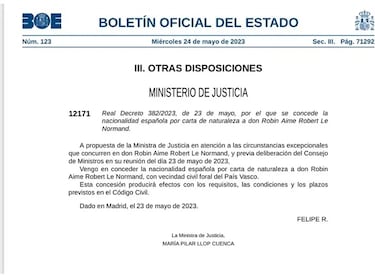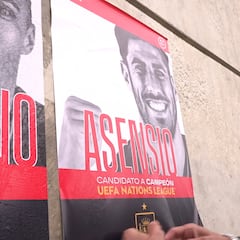Le Normand is the 44th foreign-born player to represent Spain
The French defender said in 2021,”My family will kill me if I play for Spain”. The first foreigner to play for Spain was Filipino Paulino Alcántara in 1921.

Robin Le Normand’s inclusion in Luis De la Fuente’s Spain list for this month’s Nations League Final Four was the big news coming out of Las Rozas this morning. The Real Sociedad central defender, born in northwest France, is set to become the 44th player born outside of Spain to gain Spanish nationality and elect to represent La Roja rather than his homeland.
Other players born in other countries have done so before him - the first case was over a century ago. Paulino Alcántara was born in the Philippines and his family moved to Spain when he was three years old. He spent most of his career at Barcelona and made his debut with Spain’s national team in a friendly against Belgium in Bilbao on 7 October 1921. Spain won the game 2-0 with Alcántara scoring both goals.
Alcántara was born in Concepcion, Iloilo, then a Spanish overseas territory. He already had Spanish nationality as his father was a military doctor stationed there. Alcántara, a striker who ended up playing five games with Spain, had previously played two games with the Philippines.
“𝗚𝗿𝗮𝘁𝗲𝗳𝘂𝗹 𝗳𝗼𝗿 𝘆𝗼𝘂𝗿 𝘁𝗿𝘂𝘀𝘁”#WeareReal | #AurreraReala pic.twitter.com/mKf0SQyGEU
— Real Sociedad 🇺🇸 🇬🇧 (@RealSociedadEN) June 2, 2023
Le Normand, from Brittany to the Basque Country
Robin Aime Robert Le Normand was born on 11 November 1996 in Pabu, in the Côtes-d’Armor department of Brittany. He began playing football at Lamballe, where he was studying, and at the age of 11 he was recruited by scouts at Stade Brestois. On 15 April 2016, Le Normand made his professional debut for the Stade Brestois first team in a Ligue 2 (Second Division) match against Sochaux. Brest did not make a commitment to the continuity of the teenager and told him at the end of April that he would not continue the following season.
“My family will kill me if I play for Spain”
Le Normand, in 2021.
Real Sociedad signed him on a free transfer when he was released - thanks to the monitoring carried out by Eric Olhats, a scout for the San Sebastián team in France. In 2021, the possibility of Le Normand being called by the coach Luis Enrique had already surfaced. Then, in an interview for Cadena SER’s El Larguero program, the footballer was resounding. “My family will kill me if I play for Spain.” However in February of this year, recently-appointed Spain coach Luis de la Fuente had wanted to the defender up for the Euro 2024 qualifiers against Norway and Scotland. At that time, Le Normand did not have Spanish nationality but the documentation that was granted to him on 23 May as can be seen in the BOE issued at the start of that week.

Before Le Normand, 43 footballers who were not born in Spain, were able to play for the national team. The most recent cases being Aymeric Laporte (born in Agen, France) and Ansu Fati, (born in Guinea-Bisau). Of those 43, several were born in former Spanish colonies, such as the Philippines, Equatorial Guinea or Tetouan. The vast majority, in turn, were the children of Spanish emigrants, although the other large group belonged to the so-called ‘collective of natives’, Ibero-American soccer players of Spanish descent.
At the end of the 1970s, unleashed the one of the biggest scandals in Spanish soccer, because the Spanish clubs, shielded by the norm that made any descendant of Spanish “assimilated”, as long as they had not worn the shirt of any national team. In the In the 1960s and 1970s, dozens and dozens of players arrived from South America with Spanish grandparents and great-grandparents whom they only knew through the papers provided by the club or the intermediary on duty. In some cases, the papers were fake.
| PLAYER | COUNTRY OF BIRTH | CAPS |
|---|---|---|
| THIAGO ALCANTARA | ITALY | 32 |
| DI STÉFANO | ARGENTINA | 31 |
| MARCO SENNA | BRAZIL | 28 |
| DIEGO COSTA | BRAZIL | 24 |
| PIZZI | ARGENTINA | 22 |
| LAPORTE | FRANCE | 20 |
| KUBALA | HUNGARY | 19 |
| GÁRATE | ARGENTINA | 18 |
| SANTAMARÍA | URUGUAY | 16 |
| LÓPEZ UFARTE | MOROCCO | 15 |
| DONATO | BRAZIL | 12 |
| RUBÉN CANO | ARGENTINA | 12 |
| PERNÍA | ARGENTINA | 11 |
| ZABALO | ENGLAND | 11 |
| RODRIGO MORENO | BRAZIL | 10 |
| GERARDO | MAURITANIA | 9 |
| VALDEZ | ARGENTINA | 9 |
| EULOGIO MARTÍNEZ | PARAGUAY | 8 |
| ANSU FATI | GUINEA-BISAU | 7 |
| ERRAZQUIN | ARGENTINA | 6 |
| ALCANTARA | PHILIPPINES | 5 |
| CURRO TORRES | GERMANY | 5 |
| RIAL | ARGENTINA | 5 |
| ROBERT MARTÍNEZ | ARGENTINA | 5 |
| ÁLVARO CERVERA | EQUATORIAL GUINEA | 4 |
| J.A. RAMOS | MOROCCO | 4 |
| J.L. LÓPEZ | MOROCCO | 4 |
| PUSKÁS | HUNGARY | 4 |
| CATANHA | BRAZIL | 3 |
| HEREDIA | ARGENTINA | 3 |
| JESÚS ALONSO | CUBA | 3 |
| ARMANDO | FRANCE | 2 |
| CHRISTIANSEN | DENMARK | 2 |
| ARBIDE | ARGENTINA | 1 |
| ARENCIBIA | CUBA | 1 |
| BECERRA | BRAZIL | 1 |
| CEMBRANOS | SWITZERLAND | 1 |
| GÁLATAS | PHILIPPINES | 1 |
| HERIBERTO HERRERA | PARAGUAY | 1 |
| JARA | PARAGUAY | 1 |
| PIER LUIGI CHERUBINO | ITALY | 1 |
| SAGI-BEARD | ARGENTINA | |
| TOURIÑO | ARGENTINA | |
Di Stéfano, Kubala and Puskas coincided with Spain in the so-called ‘UN Team’
The three players starred at World Cup Chile 1962
Formación de la selección española en el debut de Di Stéfano con 'La Roja'. pic.twitter.com/hx2cAOa8uQ
— AS Historia (@AS_Historia) October 5, 2021
The UN team
Liverpool midfielder Thiago Alcântara is the foreigner who has played the most games for Spain: 32. He is followed by Di Stéfano, with 31. Di Stéfano played six games with the Argentina team before making his debut with Spain on 30 May 1957, in Madrid, in a 5-0 defeat of the Netherlands. At that time, the national team recruited the great stars at Real Madrid and Barcelona.
Related stories
Before playing with Spain, Puskás had played 85 games with Hungary and even played in the 1954 World Cup final against Germany. Kubala, for his part, defended the colors of three teams: Hungary (six times), Czechoslovakia (11) and Spain (19). These three players were the fundamental base of the so-called ‘UN Team ' with which Spain appeared to play the World Cup in Chile in 1962.
Puskás is actually the origin of the norm that today governs internationally. Sir Stanley Rous, then FIFA president, was so blown away watching Puskás play with Spain that it caused FIFA to approve a provision in September 1969 which prohibits any player who has made their senior debut with one national team from swapping allegiances to play for another.


